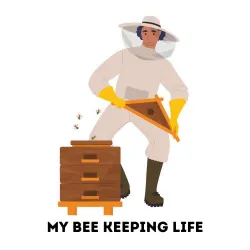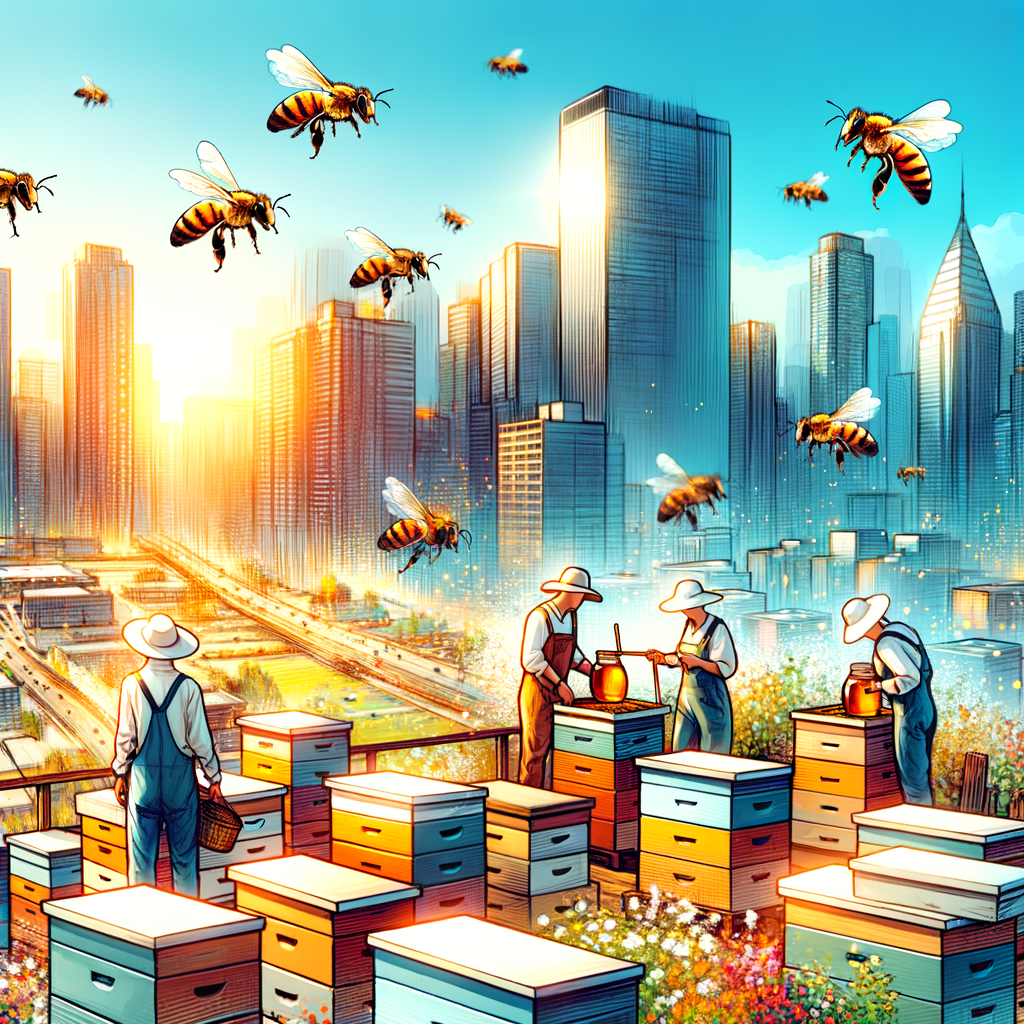
Introduction to Beekeeping Education
Bees play a critical role in our ecosystem, and beekeeping is an essential practice that helps maintain this balance. However, beekeeping is not just about having a hive and collecting honey. It requires knowledge, skills, and a deep understanding of the bees’ behavior, needs, and role in the environment. This is where beekeeping education comes into play.
-
- Understanding the Importance of Beekeeping Education
Beekeeping education is crucial for both novice and experienced beekeepers. It equips individuals with the necessary skills and knowledge to manage their hives effectively, ensuring the health and productivity of the bees. Beekeeping education also emphasizes the importance of bees in pollination, which is vital for our food production and biodiversity.
Moreover, through beekeeping education, individuals learn about the challenges facing bees, such as diseases and habitat loss, and how they can contribute to their conservation. Therefore, beekeeping education is not just about producing honey; it’s about playing a part in preserving our environment.
-
- Overview of Beekeeping Courses Available
There are various beekeeping courses available, catering to different levels of expertise. For beginners, introductory courses are available that cover the basics of beekeeping, including understanding bee behavior, hive management, and honey extraction.
For those who have some experience in beekeeping, intermediate courses are available that delve deeper into topics such as disease management, queen rearing, and advanced hive management techniques.
Lastly, for those seeking to make a career out of beekeeping, advanced courses are available. These courses cover commercial beekeeping practices, business aspects of beekeeping, and research methodologies in apiculture.
It equips individuals with the necessary knowledge and skills, promotes the conservation of bees, and can even open up new career opportunities. Whether you are a hobbyist or aspiring to be a professional beekeeper, there is a course available to meet your needs.
Beekeeping for Beginners
Embarking on the journey of beekeeping can be both exciting and rewarding. However, it’s essential to equip yourself with the right knowledge and skills to ensure your success. Here’s how you can get started with beekeeping.
Getting Started with Beekeeping
Starting a beekeeping venture requires careful planning and preparation. Two crucial steps in this process are choosing the right beekeeping school and investing in beekeeping training.
-
- Choosing the Right Beekeeping School
Choosing the right beekeeping school is the first step towards your beekeeping journey. A good school will provide you with a strong foundation in beekeeping principles and practices. Look for a school with experienced instructors, a comprehensive curriculum, and hands-on training opportunities. Remember, the quality of education you receive will significantly impact your success as a beekeeper.
-
- Investing in Beekeeping Training
Investing in beekeeping training is equally important. Training programs provide practical knowledge and hands-on experience, which are invaluable for managing your own beehives. They cover topics such as bee behavior, hive management, and honey extraction. Investing in such training will not only equip you with necessary skills but also boost your confidence as a beginner beekeeper.
By choosing the right school and investing in quality training, you can set yourself up for success in this fascinating field.
Learning Beekeeping: The Basics
When it comes to beekeeping, understanding the basics is crucial. This includes the life cycle of bees and the education needed for successful bee farming. Let’s delve into these essential aspects.
-
- Understanding the Bee Life Cycle
The life cycle of a bee is a fascinating process and understanding it is fundamental to successful beekeeping. It begins with the queen bee laying an egg. After three days, a larva hatches from the egg and is fed by worker bees. On the ninth day, the larva spins a cocoon around itself, beginning the pupa stage. After about 12 days, a fully grown bee emerges. This cycle is crucial to the survival and growth of the bee colony.
-
- Learning About Bee Farming Education
Bee farming education is another essential aspect of beekeeping. It involves learning about bee behavior, hive management, honey extraction, and disease control. Many institutions offer courses on beekeeping, providing practical knowledge and hands-on experience. This education equips you with the skills needed to manage a bee farm successfully.
Understanding these basics is the first step towards becoming a successful beekeeper. It provides a solid foundation upon which to build your beekeeping skills and knowledge. Remember, every successful beekeeper started with the basics!
So, are you ready to embark on your beekeeping journey? Remember, the world needs more beekeepers. Bees play a crucial role in pollination, which is vital for our food supply. By becoming a beekeeper, you’re not just starting a rewarding hobby or business, you’re also contributing to the health of our planet.
Benefits of Beekeeping Education
One of the most significant aspects of beekeeping education is understanding the benefits it brings to our environment. Let’s delve into these benefits:
Environmental Benefits
Bees play a crucial role in maintaining the balance of our ecosystem. Through beekeeping, we can contribute to this balance in two main ways:
-
- Contribution to biodiversity
Biodiversity is the variety of life on Earth. Bees, as pollinators, play a vital role in preserving biodiversity. They help plants to reproduce, leading to a diverse plant life. This diversity, in turn, supports a wide range of wildlife, creating a rich and varied ecosystem. By keeping bees, we can help maintain and even increase biodiversity.
-
- Pollination and its impact on agriculture
Bees are nature’s most efficient pollinators. They transfer pollen from the male parts of a flower to the female parts, allowing plants to produce fruit and seeds. This process is crucial for many of the foods we eat. In fact, it’s estimated that one third of the food we consume each day relies on pollination mainly by bees. So, by keeping bees, we’re not only helping our environment, but we’re also supporting agriculture and our food supply.
In conclusion, beekeeping education can lead to significant environmental benefits. By understanding and promoting the role of bees in biodiversity and agriculture, we can contribute to a healthier and more balanced ecosystem.
Economic Benefits of Beekeeping
When we talk about the benefits of beekeeping, we often focus on the environmental impact. However, beekeeping also offers significant economic advantages. Let’s explore two of these benefits in detail.
- Generating Income Through Honey Production
One of the most direct ways beekeeping contributes to the economy is through honey production. Honey is a versatile product with a global demand. It’s not just a sweet treat; it’s also used in various industries like food, cosmetics, and medicine.
According to the National Honey Board, the United States alone produced over 156 million pounds of honey in 2019, with a value of more than $333 million. That’s a lot of honey, and a lot of income!
But it’s not just about the honey. Beekeepers can also sell other bee products like beeswax, pollen, and royal jelly. These products also have a wide range of uses, further increasing the income potential of beekeeping.
- Job Creation in the Beekeeping Industry
Beekeeping is a labor-intensive activity that requires a lot of hands. From managing the hives to harvesting the honey and other bee products, there are many tasks that need to be done. This creates jobs, both directly and indirectly.
Direct jobs include beekeepers, hive inspectors, and honey packers. Indirect jobs are those created in related industries. For example, equipment manufacturers who produce beekeeping gear, or transport companies that move the honey from the farm to the market.
According to a study by the University of California, the beekeeping industry supports nearly 22,000 jobs in the United States alone. That’s a significant contribution to the economy!
In conclusion, beekeeping is not just good for the environment; it’s also good for the economy. It generates income and creates jobs, helping to support local communities and even entire countries.
Advanced Beekeeping Courses
For those who have mastered the basics of beekeeping and are ready to take their skills to the next level, advanced beekeeping courses are the perfect next step. These courses delve deeper into the science and art of beekeeping, providing comprehensive knowledge and hands-on experience.
Apiary Education
Apiary education focuses on the management and operation of an apiary, as well as advanced techniques in bee farming. These topics are essential for anyone looking to run a successful beekeeping business or hobby.
-
- Managing an Apiary
Managing an apiary involves more than just looking after bees. It requires a deep understanding of bee behavior, hive management, and disease control. In this part of the course, you’ll learn how to maintain a healthy and productive apiary, from selecting the right location to managing the bee population effectively.
-
- Advanced Techniques in Bee Farming
Advanced techniques in bee farming can greatly enhance the productivity and health of your apiary. This includes learning about advanced breeding techniques, queen rearing, and integrated pest management. With these skills, you can ensure the longevity of your apiary and the quality of your honey production.
These advanced beekeeping courses are designed to provide a comprehensive understanding of the complexities of beekeeping. They offer practical, hands-on experience that can be directly applied to your own apiary. By investing in your education, you’re not just improving your skills, but also contributing to the health and sustainability of our bee populations.
Honey Bee Education
Let’s dive into the fascinating world of honey bees. These tiny creatures play a vital role in our ecosystem and are responsible for the sweet honey we enjoy. We will focus on two key areas: understanding honey production and exploring different types of honey bees.
- Understanding Honey Production
Honey production is a fascinating process that involves teamwork and precision. It begins when worker bees collect nectar from flowers. They store this nectar in their honey stomachs and bring it back to the hive. Here, other worker bees take over. They chew the nectar, breaking it down into simple sugars. This chewed nectar is then stored in honeycomb cells. The bees fan their wings to evaporate the water from the nectar. Once it’s thick enough, they seal the cell with a wax cap. This capped cell is our source of honey.
- Exploring Different Types of Honey Bees
There are over 20,000 species of bees, but only a few produce honey. The most common honey-producing bees are:
| Type of Bee | Description |
|---|---|
| Western Honey Bee | Also known as the European Honey Bee, this species is the most common honey bee worldwide. They are known for their high honey production. |
| Italian Honey Bee | These bees are a subspecies of the Western Honey Bee. They are popular among beekeepers due to their gentle nature and high honey production. |
| Carniolan Honey Bee | Originating from Slovenia, these bees are known for their rapid spring buildup and excellent foraging skills. |
Understanding the different types of honey bees and their characteristics can help beekeepers choose the right species for their needs. Remember, each type of bee has its unique traits and requirements, so it’s essential to educate yourself before starting your beekeeping journey.
Case Studies: Success Stories in Beekeeping
Let’s delve into some real-life examples that demonstrate the transformative power of beekeeping education. These case studies highlight the positive impacts of beekeeping training on individuals and communities.
-
Case Study 1: Successful Bee Farming Education
In the rural town of Honeyville, a local school incorporated bee farming education into their curriculum. The goal was to equip students with practical skills while promoting environmental awareness.
Within a year, the students had established a thriving bee farm. They harvested honey, made beeswax products, and even sold them at local markets. The project was not only financially beneficial but also fostered a sense of responsibility and entrepreneurship among the students.
Moreover, the school reported a noticeable increase in student engagement and performance. The hands-on nature of bee farming made learning more interactive and enjoyable, leading to improved academic outcomes.
Outcome Impact Established bee farm Practical skills and environmental awareness Honey and beeswax products Financial benefits and entrepreneurship Improved student engagement Interactive learning and improved academic outcomes -
Case Study 2: Impact of Beekeeping Training on Local Communities
In the community of Beeland, a non-profit organization introduced beekeeping training to help boost local economy. The training program was designed to be easily understood and implemented, even by those with no prior experience in beekeeping.
The impact was significant. Many households started their own bee farms, leading to a surge in local honey production. This not only created a new source of income but also promoted biodiversity and helped to pollinate local crops.
The success of the program led to its expansion to other communities, demonstrating the potential of beekeeping as a sustainable and beneficial practice.
Outcome Impact Local bee farms New income source and biodiversity Increased honey production Economic boost and crop pollination Program expansion Sustainable practice and community development
These case studies demonstrate the power of beekeeping education. It’s not just about producing honey; it’s about fostering responsibility, promoting biodiversity, and empowering communities. The success stories of Honeyville and Beeland serve as inspiring examples for other communities to follow.
Conclusion: The Future of Beekeeping Education
As we wrap up our exploration of beekeeping education, it’s important to look ahead and consider what the future holds. The world of beekeeping is ever-evolving, and so too is the education that supports it. Let’s delve into the continued importance of beekeeping knowledge and the emerging trends in beekeeping education.
- Continued Importance of Beekeeping Knowledge
Beekeeping is not just a hobby; it’s a vital part of our ecosystem. Bees play a crucial role in pollination, which is essential for the growth of plants and the production of food. As such, the knowledge and skills associated with beekeeping will continue to be of great importance.
Moreover, as environmental concerns continue to rise, the role of beekeepers in maintaining and protecting our bee populations becomes even more critical. Beekeeping education, therefore, remains a key tool in ensuring the survival of these vital creatures and, by extension, our planet.
- Emerging Trends in Beekeeping Education
As we move forward, we can expect to see several emerging trends in beekeeping education. One of these is the increasing use of technology. From online courses and webinars to virtual reality experiences, technology is making beekeeping education more accessible and engaging than ever before.
Another trend is the growing focus on sustainable and organic beekeeping practices. As the world becomes more environmentally conscious, beekeeping education is adapting to reflect these values. Future beekeepers will not only learn how to care for bees but also how to do so in a way that respects and protects the environment.
Finally, we can expect to see a greater emphasis on community and collaboration in beekeeping education. Beekeeping is a communal activity, and learning about it can be a social experience. This sense of community can help to make the learning process more enjoyable and rewarding.
It will continue to evolve and adapt, ensuring that the next generation of beekeepers is well-equipped to carry on this important work.








